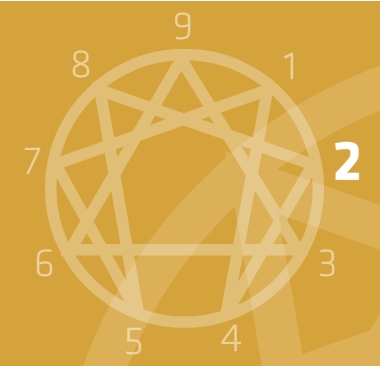Enneagram Type TWO

 The Helper
The Helper
At
their best,
they are altruistic people who can quickly empathize with the needs
of others. They are highly gregarious and know how to establish
instant rapport with others. They are generous people who voluntarily
help others as a selfless act of support and love—not to obtain
something in return.
Although
they are always ready to help others, they respect and are attuned to
their own needs and know how to say no and how to set boundaries.
Their giving is not at the expense of their own needs. They love
working with people; they have high energy and are very expressive
while also being gentle, compassionate, and sensitive.
They
can truly listen empathically to another person and help him or her
on their own terms: they are able to give their support in the way
people want to receive it.
In the Stuckness Zone, an intense desire to be needed and become indispensable to others starts running inside them. An “I must give to be loved” belief dominates their thinking. Their attention tends to go automatically to detecting and anticipating the needs of others. They may become helpers, rescuers, and pleasers, trying to feel indispensable to too many people and projects, trying too hard to obtain approval, acceptance, and appreciation for their generous acts. (Although there is always some minimum degree of selectivity in their picking whom to help.) This makes them flatterers and makes them act receptively interested in others most of the time.
Sometimes
they may act intrusively, as if forcing their help and advice on
others, offering their insights when not asked. They may act as if
they know better than you what you truly need. They can be
controlling, possessive, manipulative, patronizing, and hostile,
treating others with condescension and a
“you-could-have-never-done-it-without-my-help” attitude.
They
trap themselves in a triple way: first, it is hard for them
to request and receive from others; second, they feel guilty
about being selfish when they pay attention to their own needs;
third, they expect others to do the same as they do for them
(to divine their needs so they don't need to ask for things).
As
a result, their personal needs become further repressed and unmet.
Anger
builds inside since they feel they have dedicated too much to others
while repressing their own needs, and they feel used, controlled, and
unappreciated. Sudden emotional outbursts, upheavals, and accusations
can be common. They can be confused regarding their own needs. Stress
builds and mental, physical, emotional, and financial exhaustion
arise since they have often dedicated all their available resources
in their quest for approval, acceptance, and love from others.
Type description, from "From Stuckness to Growth: Enneagram Coaching" (2012) by Yechezkel & Ruth Madanes
Type description, from "From Stuckness to Growth: Enneagram Coaching" (2012) by Yechezkel & Ruth Madanes
